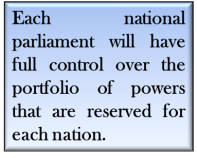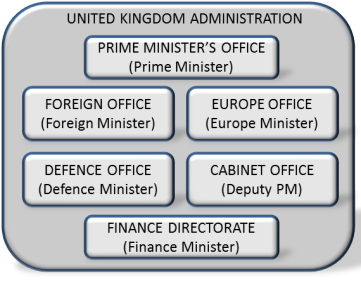A new structure of government will be established in the United Kingdom
The parliamentary process of government in each nation will operate much as it does today. Parliamentary elections will elect members of parliament and the party that gains enough seats to form a government, or can create a coalition to form a government, will take power. The leader of the ruling party will become First Minister and the First Minister will form a Cabinet. The government in each parliament will manage the legislative programme and conduct parliamentary business in the normal manner. Each national parliament will have full control over the portfolio of powers that are reserved for each nation.
Beyond this, however, the governance of the United Kingdom will be built on the new frameworks of government envisaged in this blueprint. Each national Cabinet will select a team of ministers to join the new United Kingdom Cabinet. As the United Kingdom Cabinet will operate within its own pre-defined lifecycle, divorced from the lifecycle of the national parliaments, it is quite likely that when a new government is elected for a nation the ministers selected to participate in the United Kingdom Cabinet will be joining a cabinet that is in mid-term. These new ministers will be replacing the previous team of national ministers, which of course may have been themselves. Each new minister will be appointed to one of the vacant roles in the United Kingdom Cabinet; they will simply replace the previous incumbent. The new First Minister joining the United Kingdom Cabinet will take on the role of United Kingdom Prime Minister or Deputy Prime Minister depending on which role is vacant. These allocated roles will continue within the United Kingdom Cabinet until the term of the Cabinet ends and the members of the United Kingdom Cabinet are required to rotate roles.
The creation of this new Union will result in the continuation of a number of unified departments of state, and possibly the creation of new departments. The actual departments of state that exist will be subject to negotiation and agreement but the unified departments are likely to be:
- Cabinet Office - Just as the Cabinet Office today is responsible for supporting the Prime Minister and the
Cabinet of the UK, the proposed new Cabinet Office will perform the same function. It will co-ordinate the delivery of unified government objectives and policies across the other unified departments.
However, it will also be responsible for coordinating these activities across the two national governments by liaising closely with Cabinet Offices in Britain and Scotland;
- Foreign Office - this department will operate much as it does today being responsible for promoting the
interests of the United Kingdom as a whole overseas. Although this department will be responsible for representing the United Kingdom as a whole it will need to achieve this by ensuring that the
national policies of each nation are being fully taken into account;
- Defence Office - the defence of the United Kingdom will continue as it does today with a unified defence
force and unified defence administration. Very little will change in the way this office is run and administered. There will be a number of important implications resulting from unified defence
including the acceptance by many Scots opposed to a nuclear military presence on Scottish soil that this presence will still need to be maintained. This will be one of many concessions that will be
necessary to cement the new Union;
- Europe Office - the management of affairs in Europe on behalf of two governments will be a significant undertaking and the creation of a new department of state for undertaking this activity is envisaged. Although the United Kingdom minister for Europe will be responsible for most of the interaction with Europe there will also be a need for the national governments to participate. This situation already exists today with UK and devolved ministers meeting at regular intervals through the Joint Ministerial Committee (Europe), chaired by the Foreign Secretary, to "discuss matters bearing on devolved responsibilities that are under discussion within the European Union" (Cabinet Office, 2010). Additionally, as is also the practice today, national ministers will attend relevant international negotiations when these negotiations are likely to have a direct impact on national interests e.g. EU fisheries negotiations. It is expected that the protocols that exist today can be adapted to meet the proposed new structure of new United Kingdom government.
In addition to these four principal departments of state it is envisaged that a Finance Directorate will be required to manage the funds of the United Kingdom administration. It is also envisaged that a Prime Minister’s Office will be required to perform the role undertaken today by Ten Downing Street.



